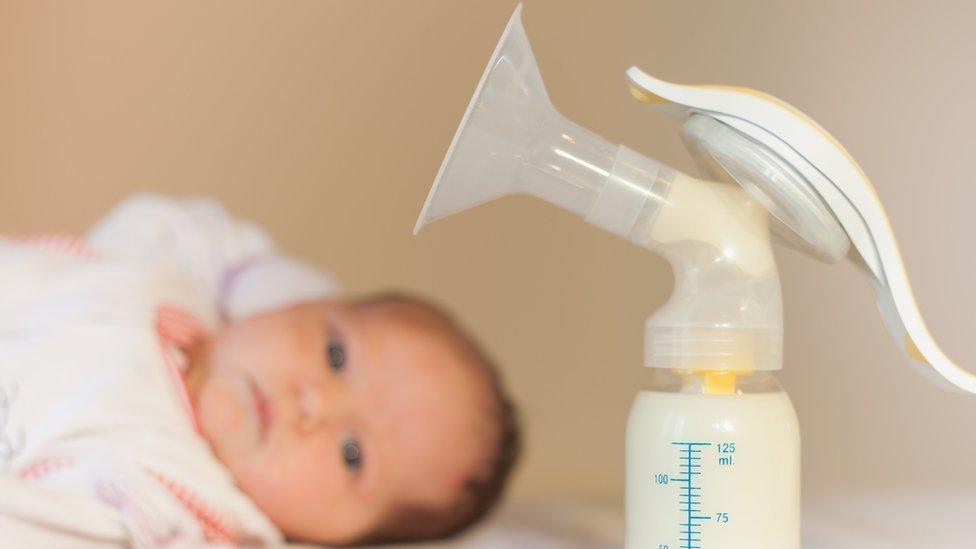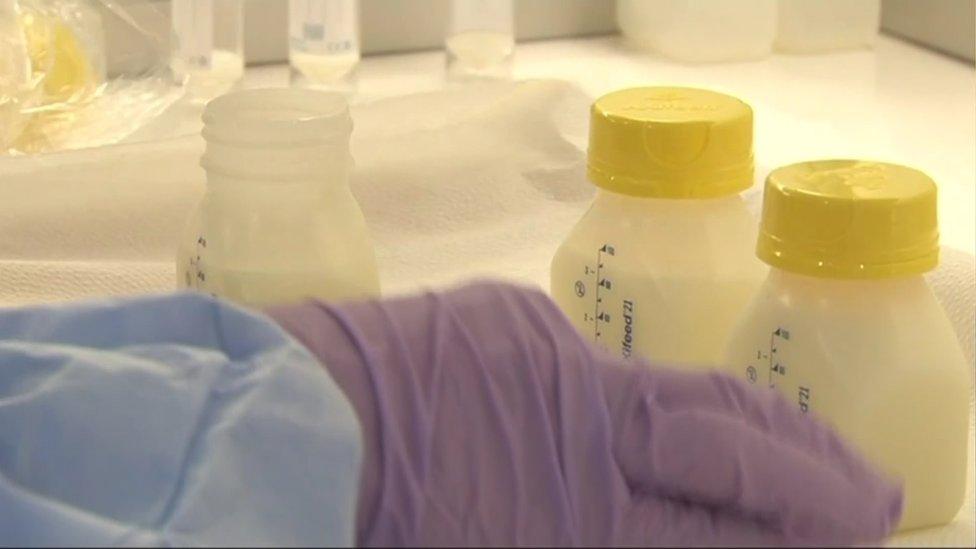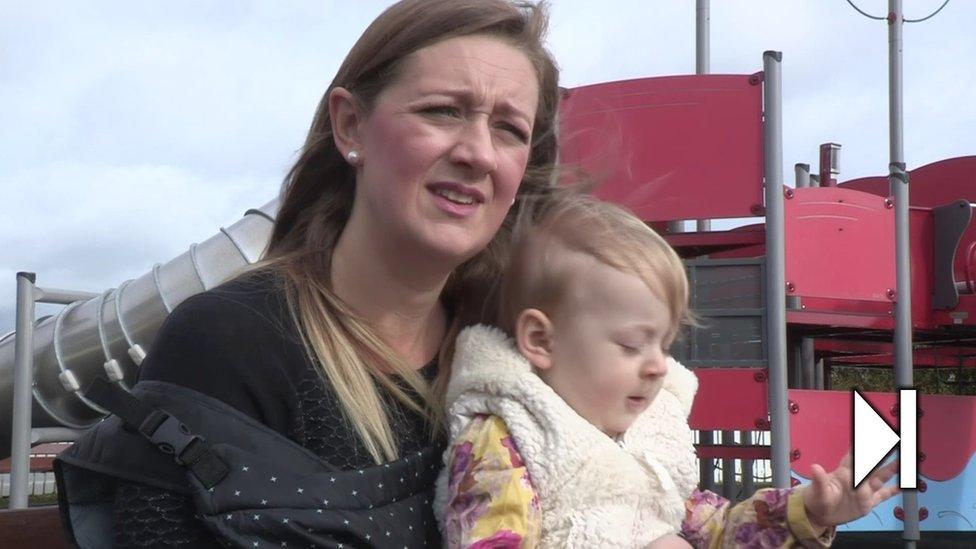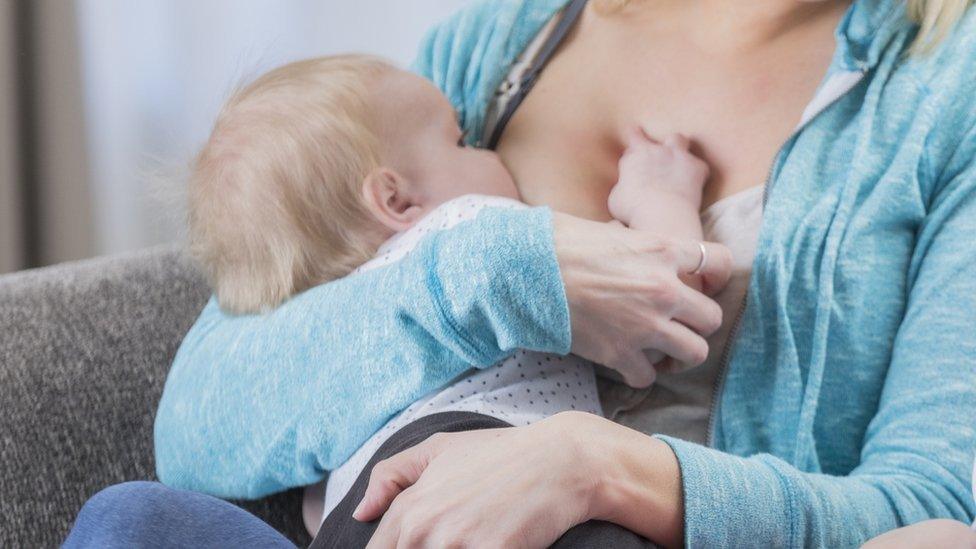Bacteria causes suspension of breast milk service
- Published

Volunteers use breast pumps to express milk and donate supplies
A service supplying donated breast milk to premature and seriously ill babies across Ireland has been suspended after bacteria was found in the water supply.
The Human Milk Bank moved from Irvinestown to the South West Acute Hospital in Enniskillen in January.
Routine testing of the cold water supply to the pasteuriser revealed the presence of bacteria.
The Western Trust said no milk was supplied to baby units during the relocation period.
It added that no babies would have come to harm as a result of this issue.
The service has been suspended for the last seven months while essential remedial work is carried out.
The milk bank helps some of the tiniest, premature babies, and also babies who have serious heart or intestinal problems.
Breast milk helps babies fight viruses and bacteria, and, in particular, it can help to protect the gut from rupturing - a potentially life-threatening condition.

The milk is often given to premature or ill babies
The service also supports mothers of twins, triplets and quads who are unable to produce enough milk of their own.
The Western Trust said it immediately contacted neo-natal units and requested that all unused milk was disposed of.
Subsequently 259 litres of donated milk was thrown away.

A County Antrim father says that his premature baby was not given donated breast milk after his birth in March as he was told no donor milk was available.
Joel Clarke's son, Wilfred, has a life-threatening bowel condition. He is now six months old and is in intensive care.
Mr Clarke claims that breast milk only became available from England in May - four months after the service run by the Western Health Trust was suspended.
The Belfast Trust said it was unable to discuss individual issues.
A spokesperson said: "When we first became aware of lack of provisions, we immediately took action to procure a supply from England.
"At no time was there any risk to babies in our care."
"We are importing milk from England as an interim measure and reassure the public that there is no shortage of milk in the regional neo-natal unit."

Last week, donors received a letter from the milk bank informing them that "regretfully" their donation could not be used.
The letter went on: "The milk bank has recently relocated to more suitable accommodation in the South West Acute Hospital.
"Regretfully, we were unable to use your donation on this occasion as we encountered difficulties achieving processing standards during this relocation period."

Karen Stuart ,pictured with baby Sophia, donated six litres of breast milk
Karen Stuart from Bangor donated six litres of milk while breastfeeding her daughter Sophia.
She said: "Normally they send out a letter once your milk has been used with a little badge saying 'well done' and letting you know how many babies that it helped so I was waiting for that letter.
"So it was a bit of a shock then when this other letter came through and the milk that took, I think, about 60 hours in total to pump, had all been disposed of. I know a lot of other mums were in the same boat.
"We were just a bit gutted really, just there's a lot of time and effort, and we were really wanting to help some little babies."
Antibiotic resistant
The Western Trust said it had discovered pseudomonas aeruginosa in the water supply at the hospital.
The bacteria can cause a wide range of infections, particularly in those with a weakened immune system including newborn babies.
It is also resistant to many commonly-used antibiotics.
The trust said it "is working diligently to achieve the high standards required to recommence this service".
Neonatal units are currently having to source alternative supplies of breast milk.
The Belfast Trust said that it is importing milk from England as an interim measure and reassured the public that there is no shortage of milk in the regional neonatal unit.

The Human Milk Bank has been operational since 2000 and processes more than 1,500 litres of human donor milk each year.
In 2016, the service helped more than 900 babies and last year the Western Trust appealed for more donors as stocks were running low.
In a statement the Western Health Trust said it "recognises the commitment and time required from donors to donate milk to the milk bank."
"It is only with the support of donors that this invaluable service can continue.
"However, it is essential that the donor breast milk does not pose any risk to the vulnerable and sick babies to whom it is given.
"As there was potential risk associated with our findings the Trust made the very difficult decision to dispose of the donated milk."